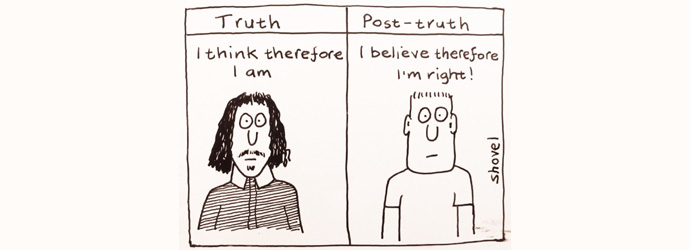
Do facts matter anymore?
The person who would go on to win the 2016 US Presidential election made statements that were true (or mostly true) only 15% of the time over the election cycle. His opponent’s statements were true or mostly true 55% of the time. Fake news was shared more than correct news. Last year, the Oxford Dictionary made “post truth” its word of the year.
Yet this phenomenon is not new. At a recent UWA lecture by Stephan Lewandowsky provided analysis that showed how Fox News (in 2010) misinformed twice as much as other news outlets (running stories on Obama not being born in the US). Even earlier, in 2006, Republican supporters in the US believed there were weapons of mass destruction found in Iraq, even after a report conclusively found (in 2004) that no such things were ever there, or found.
Post truth politics work, it would seem.
Two thirds of white males voted for the current US President, and he actually did better than his opponent in the mid-income range. The poorest actually voted for Clinton.
Despite all the lies and half truths, on both sides, supporters of each candidate believed their person was telling the truth 94% of the time. Research has shown that preconceived support is the largest determinant of whether you believe a proposition or not.
In other words, it’s become tribal. Even if supporters are shown that their candidate has told a lie, they accept this, and it does not change their support.
We like to hear good news – it’s only natural. We prefer to hear information that marries with our view of the world. Facts that differ with our own values and inner held beliefs are uncomfortable, and on the whole, we prefer not to be uncomfortable. We’re wired that way. When your team is being belted in the game, you might switch off in disgust, or start walking down the aisles to beat the traffic home. Why prolong the agony?
And then along comes social media, and we can gather whatever information we want. We can live in a cocoon of information that pleases us, whether it is true, biassed or just plain made up. In fact, Google and Facebook’s algorithm’s serve it up to us, because they know what we prefer. They know what we will pause and comment on, click and share.
Now, I’m not blaming the media, or social media, or tribalism, or how we are wired … it is what it is. However, we need to recognise this, if we are to deal with it. Because if not, then we are moving into a world where facts don’t matter, and that’s dangerous.
The trouble is that opinions are cheap and facts are expensive. Worldwide, media is trying to find a business model that will pay for facts, now that the former business model (classified and display advertising) has moved online. Some media don’t care as much as they used to about facts, and peddle opinions, or just promotions.
Yes, media should have seen it coming, but that’s easy to say in hindsight, and what move should they have made anyway? Were they always going to be bowled over?
True, truth is in the eye of the beholder, but we have seen instances (at the highest level) of just plain faced lies (proven lies) being waved off and ignored, as if at least trying to say things as they are is in itself unimportant. It’s not how things are anymore (people don’t want that), it’s how they make you feel.
I don’t know what the answer is, but I’m out there looking… answers on a postcard please.


